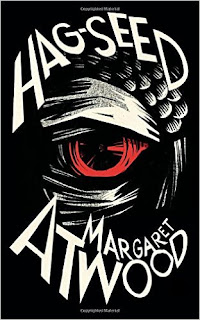After many years as Artistic Director of the
Makeshiweg Theatre Festival, Felix is finally about to have one of Shakespeare’s
most famous and magical plays performed: The
Tempest. This will be a show like no other before – but fate has another
plan for him; or rather Tony, his assistant, who has to deliver the information
of Felix being fired by the board, a treachery well played by the second in
row. Felix withdraws to some far away place where he not only mourns the loss
of his job, but also the loss of his beloved daughter Miranda to whom he still
talks as if she were alive. One day, the chance of getting back to work arises:
The Fletcher Correctional Centre has set up some correction scheme involving
theatre and Felix is to become the new teacher. He makes the prisoners
experience Shakespeare in a completely new way and the outcome is stunning. In his
fourth year, he selects The Tempest
to see it finally on stage – and with the magical play comes his chance of
revenge.
Hag-Seed is a novel of the Hogarth series in
which authors re-write Shakespeare’s plays and transfer them to our days. Margaret
Atwood has chosen quite a clever way of doing so, she integrates Shakespeare’s
play into her novel, but that is - of course - not all this wonderful author
manages to do: we have the play in the play, and we have characters who
themselves incorporate the roles of the play in their fictional lives. Felix is
undoubtedly Prospero using all his power to steer the people around him and to
manipulate reality. His daughter Miranda, albeit dead, parallels Shakespeare’s
Miranda in a very clever way. Sal and Tony, Felix’ enemies in the theatre
world, can easily be identified as Antonio and Alonso. And the prisoners act as
spirits and goddesses performing for Prospero-Felix. Apart from the characters,
there are so many parallels between the drama and the novel, it would go far
beyond the scope of this review to name them all.
Finding the parallels and detecting how
Margaret Atwood transformed the drama into a modern novel, is great fun, but
even more so is reading the dialogues. It is rare to have so much pleasure and
entertainment when reading a rather serious plot; Felix’ interaction with the guards
is hilarious, his work with the prisoner-students and their questions against
the background of their criminal records and experiences in a world far away
from elitist theatres, are fascinating. I wonder if the approach Felix’ chooses
might not actually be the perfect way to bring Shakespeare’s ghost closer to
today’s youth and thus become a model for teachers.
We know how much is hidden in Shakespeare’s
plays and I have the impression that there is so much more in Atwood’s novel which
I did not see at the first reading. This is definitely a novel worth giving a
second read to dig deeper into what she has created. Coming back to the idea of
the Hogarth series, I liked Anne Tyler’s version of The Taming of the Shrew a lot, but Hag-Seed is simply a masterpiece.

